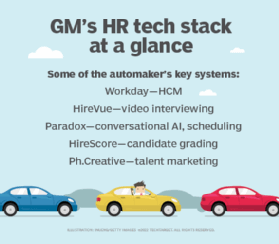
Getty Images
GM revamps talent acquisition strategy with new tech
General Motors' talent acquisition strategy includes new tools to improve recruiter efficiency, including chatbots, automated scheduling and candidate grading systems.
The talent acquisition staff at General Motors is expecting more than one million job applications this year. It is also tasked with filling new types of jobs because of the company's move to electric vehicles. But the automaker's talent acquisition staff isn't growing to tackle the growing job responsibilities. Instead, it is turning to third-party HR technologies to automate and streamline recruiting processes.
GM recently added technology services from Beamery Inc., as its talent CRM; HireScore, a system that analyzes, prioritizes and grades candidates; Paradox Inc., which makes chatbots used in recruiting; and Ph.Creative, a talent attraction and an employer branding platform.They are all part of a retooling of its talent acquisition strategy.
Kyle Lagunas, head of GM's talent attraction, sourcing and insight, started working at GM one year ago. He described an overburdened talent acquisition operation at the recent HR Technology Conference & Exposition.
Staffing levels for that HR team have been flat, and the HR technology options limited, he said. At the time, the automaker's HR tech stack included Workday HCM, HireVue's on-demand video interviewing and some LinkedIn tools.
"And that was it, that was literally it," Lagunas said.
He saw a need for a new talent acquisition strategy built on technology to improve recruiter efficiency. He candidly explained their process for rebooting talent acquisition, disclosing GM's HR software decisions at the virtual event, adding that it was essential to do so.
"I don't want to come out here and just talk about the ideas I have," Lagunas said during his presentation. "If I can be a peer leader and lead with transparency, I hope that others will return the favor."
Competitive hiring market
GM's focus on talent acquisition is something shared by other firms.
It is an "incredibly competitive labor market," said Josh Bersin, an industry analyst, during another conference presentation.
Firms "are worried they will not be able to find the people they need," Bersin said.
Bersin sees this as one of the healthiest times in the HR technology market, and users are adopting multiple HR tools to add to new capabilities on top of their existing HCM platforms. A question HR managers have when using third-party tools is what happens when the market consolidates, Bersin said, but he doesn't see much risk.

"The only thing that would lead to a consolidation of the HR market is a recession,"Bersin said. If there is a recession, "a lot of these vendors just kind of run out of money, and they get acquired. But we're not on that road."
Lagunas said some of the HR vendors GM is working with are building AI tools.
HireScore, for example, uses machine learning and natural language processing to help recruiters prioritize candidates for job openings. It analyzes the candidate information against a posting, helping to find the best candidate matches. It also gives recruiters "explainable AI," which provides insights into why it scored a candidate a certain way, such as the background or experience that came from a talent competitor, he said.
It helps to "make decisions faster but be more informed about why we're moving the way that we are," Lagunas said. "AI is augmenting our best practices."
Paradox's conversational AI is being used to augment recruiters' work. He cited candidate scheduling as a time-consuming effort, and with this tool, "we're able to free up recruiters to stop trying to chase down hiring managers for like times."
Since GM's request for proposals last summer, it is now live, in the early phases, with Paradox and Beamery. They are going live with HireScore in April, he said.
Employers are broadly increasing their spending "on all things talent acquisition," said Madeline Laurano, an analyst at Aptitude Research, at the conference. In a recent survey, it found that more than 60% of firms are increasing their investments this year in talent acquisition technology, she said.
Patrick Thibodeau covers HCM and ERP technologies for TechTarget. He's worked for more than two decades as an enterprise IT reporter.




